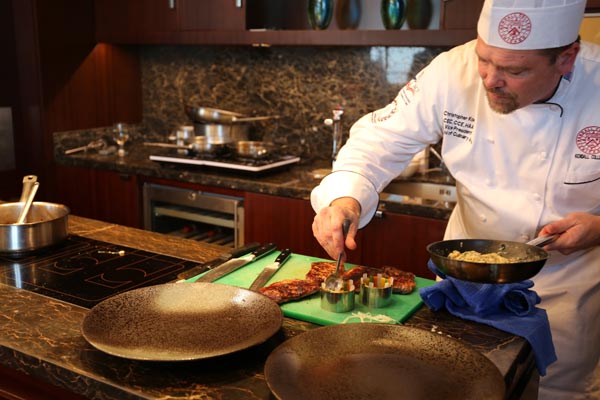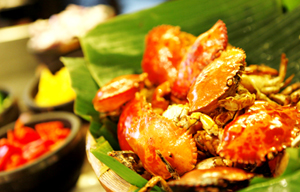
 |
|
Chef Christopher Koetke demonstrates Kendall College's culinary arts courses in the World Trade Hotel in Beijing on Oct 27. Cheng Yingqi / China Daily |
In spite of the tiredness caused by 14 hours flying and the time difference between Beijing and Chicago, chef Christopher Koetke got up early and spent four hours preparing braised beef ribs and sautéed beef steak. The guests he will serve is not Bill Clinton, not the Rolling Stones, not Jonas Edward Salk, but gourmets and parents from China.
On Oct 27, Koetke, as the vice-president of the School of Culinary Arts of Kendall College, gave a culinary course in the World Trade Hotel in Beijing to promote the college's culinary arts education. In one and a half hours, Koetke demonstrated what students would learn at Kendall in the four-year Bachelor program -- from knife skills to cooking vegetables and meat, and to kitchen sustainability to fine dining.
"Today you are all my students. And I will take you through the journey of becoming a culinary profession," he said, holding a chef knife horizontally. "In kitchens, it all begins with knives."
Students will spend the first quarter learning cutting skills – they will practice cutting all kinds of vegetables for months till they are highly skilled.
"We have 13 kitchens and three restaurants for our intensive style of teaching. Since kitchens are busy places, we have to teach in an intensive way to get people ready for working in real kitchens," Koetke said.
"So, at Kendall it will not happen that two people are practicing while two standing there to watch. We have enough facilities for the intensity of teaching, and we want our students to be learning, learning and learning instead of standing, watching and wasting their time."
Besides learning on campus, students will learn at three restaurants owned by the college as part of the curriculum, one of which named The Dining Room, is a Michelin recommended restaurant.
"The three restaurants are also part of the intensity. In one restaurant we serve 400 people in one and a half hours, and we do that three times a day. The second restaurant is a fast service restaurant, in which the kitchen only has no more than five minutes to bring the food. And the third, the Fine Dining, is with real people, real money, wine list, beer list and everything," Koetke said.
The students will have their lessons at the restaurants of the college, before they move forward for internships in companies that have cooperative relationship with the college, which include some big-brand companies like Hilton Worldwide, the Peninsula, Hyatt Hotels Cooperation and Pure Kitchen.
Mao Yi, a 32-year-old student of Kendall, said she benefited from the intern opportunities.
"Now I am choosing between two three-to-six month internship offers of Michelin-starred restaurants in Chicago, which would be rare opportunity if I were studying culinary art at home," Mao said.
Before deciding to start a culinary career, Mao spent ten years in China as an English language teacher.
"When I had enough money to pursue my dream, the image of fine food lingered for a long time in my mind, so I decided to change my profession. Since I do dream of opening my own restaurant some day, I believe the skills I learned from Kendall and the experiences I gathered here will be great help," she said.
"Most Chinese students want big career. They want more than just becoming a chef but opening their own business some day," said Koetke, the chef.
This is the first time that the college promotes its culinary courses in China, amid the recording growth of the hospitality industry in the country.
According to data released by the World Travel & Tourism Council, the tourism sector contributed $850 billion to China's GDP in 2013, equivalent to 9.2 percent, while the industry supports nearly 65,000 jobs, 8.4 percent of all employment in the country.
"We have an increasing number of students from China, which is not surprising because hospitality is growing significantly in China. And when hospitality grows, tourism grows, and then culinary grows," Koetke said.
"Now Chinese customers are asking for a foreign chef to represent the cuisine, since a restaurant is part of a larger concept - Western cuisine. As a result, foreign owners and managers in China prefer to have a foreigner leading the kitchen," said Xavier Igloi, food and beverage consultant of International recruitment consultancy PSD Group.
"That is to say, a local chef who has been abroad or internationally trained and has a similar background, is preferred, as they understand both cultures well and can communicate with the managers," he said.
The monthly pay of head chefs in China ranges between 12,000 yuan to 30,000 yuan, depending on the location of the restaurant and the expertise of the chef.
However, Liu Peng, a Chinese chef who had worked for restaurants both in and out of China, said the overseas studying experience would not guarantee students success in China, unless they adapt to the actual condition.
"There is big disparity between domestic and foreign kitchens, so a new cook with overseas background should try not to copy their experiences in foreign kitchens," Liu said.
For example, a kitchen in the US, usually with eight to nine people, serves twice the diner volume to that of a 13 to 14-people kitchen in China.
"So the cook, with overseas experiences, might find it is not so busy in a Chinese kitchen. However, he or she shall always find a way to keep the passion for work, and to integrate their knowledge and skills into local culture."

China's top 10 foodie cities |

Cute boxed meals |

Muslims greet annual festival of Eid al-Adha in Yinchuan |

Cafe Noir hosts Singapore food festival |

7 hot drinks to make Christmas merrier |

Sleep in a snow hotel |

Pastry Paradise exhibition opens in London |

Kids Rock the Kitchen with Chopsticks & Beyond |